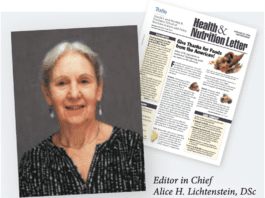Active Workers at Lower Risk of Heart Failure
Much like exercising in your leisure time, staying active on the job can be good for your heart: Researchers report that on-the-job physical activity is associated with reduced risk of heart failure. Overall, in a study of nearly 60,000 Finnish men and women, as levels of physical activ- ity at work went up, the risk of heart failure went down.
Healthy Eating Can Put Metabolic Syndrome into Reverse
C an metabolic syndrome be reversed by eating right? A new study says the answer is yes. Metabolic syndrome is an increasingly common term covering a complex of conditions, including central obesity (high waist-hip ratio), high blood pressure, unhealthy blood cholesterol levels and insulin resistance. Together, this cluster of risk factors sharply increases the danger of developing heart disease and diabetes. According to the American Heart Association, more than 50 million Americans suffer from metabolic syndrome.
Low-Carb Diets High in Meat Riskier Than Veggie Versions
I f youre tempted to try an Atkins-style diet, go easy on the steak and bacon. A new analysis of data on nearly 130,000 men and women over more than two decades reports that low-carb diets relying more on meat for fat and protein were associated with a 23% increased risk of death. On the other hand, low-carb diets with higher intakes of vegetables and fruit were associated with a lower risk of dying.
New Heart Trials Put Omega-3s to the Test
What are heart patients to make of two new clinical trials of the omega-3 fatty acids found in fish oil? In one study, patients with early heart failure showed signifcant improve- ments on several markers of cardiovascular health when taking omega-3 supplements, compared to a placebo. But a Dutch clinical trial of heart-attack survivors failed to find any protection against second heart attacks from margarine enriched with omega-3s.
Extra B Vitamins Slow Dementia, May Offer Alzheimers Hope
Supplemental doses of B vitamins were found to slow the progress of dementia in a new British clinical trial, again raising hopes that they may prove to be a defense against Alzheimers disease.
Omega-3s in Fish May Help Slow Biological Aging
The omega-3 fats in fish oil, touted for their heart-health benefits, may have a bonus for heart patients: slowing biological aging at the cellular level. In a study of patients with stable coronary artery disease, those with the highest blood levels of omega-3s also showed the least shortening of telomeres, a sign of biological rather than chronological aging. Patients with the lowest omega-3 levels, on the other hand, had the fastest rate of telomere shortening when researchers compared measurements from the start of the study to five years later.
High Blood Pressure May Also Alter Your Brain Circuits
Two new studies point to a link between high blood pressure and increased risk of dementia. In one eight-year study of 1,403 women ages 65 and older, MRI scans revealed that those with hypertension had significantly more white matter lesions- indicating weakening of the insulation around nerve cells in the brain necessary for communication. The higher the blood pressure, the more serious the damage.
Insufficient Vitamin D Could Boost Arthritis Risk
Vitamin Ds important role in bone health, already linked to protection against osteoporosis, may extend to joints and prevention of the most common form of arthritis. A new study reports that men with insufficient vitamin D levels were twice as likely to have hip osteoarthritis as those with normal vitamin D.
Affordable, Nutritious Fish Year-Round? Can Do!
You know you should eat more fish. The American Heart Association recommends at least two servings a week, especially fish high in hearthealthy omega-3 fats. But fresh fish can be expensive and spoils quickly. Maybe its time to rediscover canned fish.
Over 70 and Overweight? Its Not So Bad
After age 70, a few extra pounds may not be so bad. New Australian research adds to the evidence suggesting that the rules about weight and health are different for older people- and that Body Mass Index (BMI) isnt a perfect tool. The study of 9,240 men and women ages 70 to 75 found that being overweight was associated with a 13% lower risk of mortality from all causes. Normal-weight and obese participants had a similar, slightly higher risk of death from all causes.

























